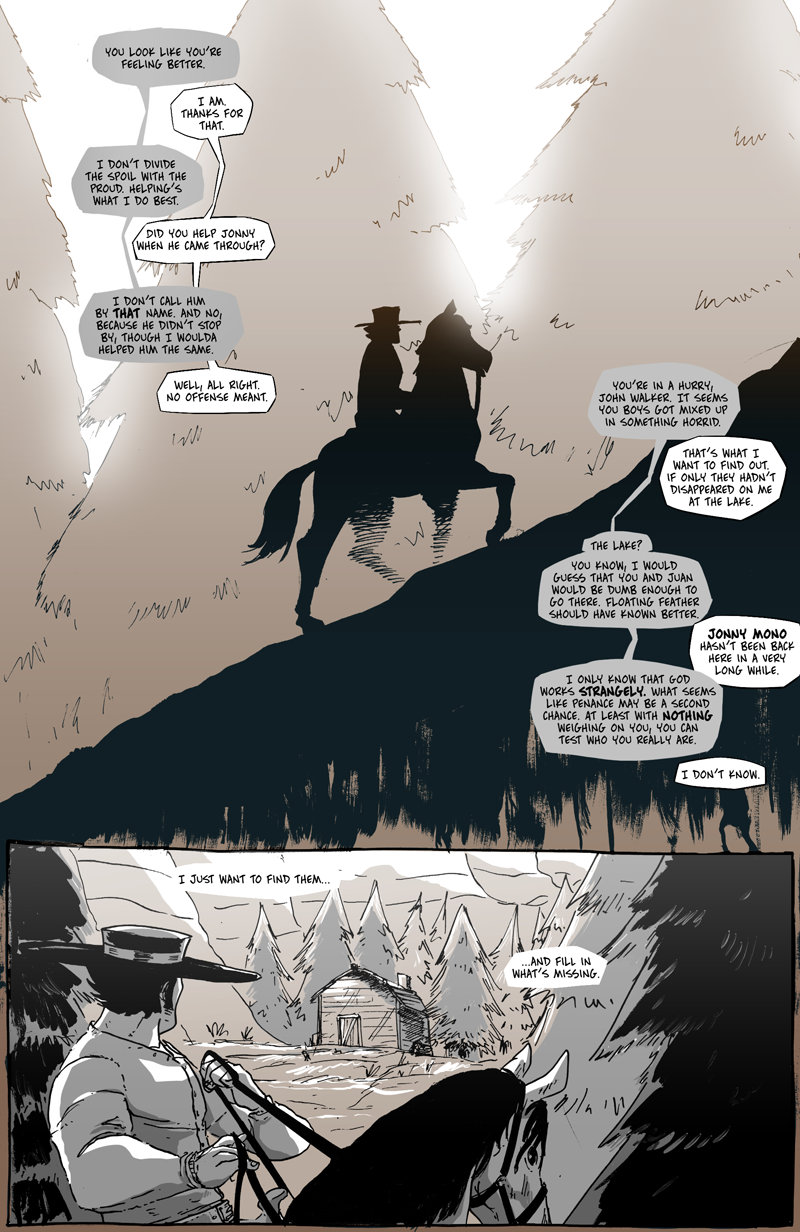The Fill
I guess I should say it now since it’s getting hit pretty heavily on this page (even though it hasn’t been brought up at all; it’s mostly about getting out there before people bring it up), but Lady May has been the simultaneous challenge and pleasure to write because of her being born-again. I was intrigued with the idea of having a character who is an accidental humanist because she (in this case) morally exists in cross-purposes. There is no doubt that May is devoutly Christian; however, she cannot let go of her roots in the indigenous culture when she hides Long John in the “dark room.” Even John points out the Ghost Dance imagery; being hidden away, it (with hope) visualizes May’s existential struggles.
Lady May is a woman who has been through a lot and has gained a lot of wisdom from the experience. However, as a person who has undoubtedly been at the bottom of the barrel a few times, she has looked for outside verification of her choices, and she finds those in religions both indigenous and Christian––I kind of view it as two proselytizing dogmas cancelling each other out (in a sense, to be reductive), leaving the very personal and ultimately humanist message to hang on its own in the resulting vacuum.
I say this because I have no agenda here––having read many comics and watched movies and television shows that do have subversive messages to them––other than to tell the story of Long John Walker at this moment in time. I have no religious background and yet I have no bone to pick with any religion. It’s a case of ignorance rather than rejection: I was brought up in a non-religious environment, not an anti-religious one.
With that in mind, it would be ignorant, anachronistic, and disingenuous of me to leave out religion in a story that takes place in the 1880s frontier. With enough research and planning, however, I was able (to the best of my abilities) to make what limited knowledge I gathered work for the story and the characters with respect and gravitas (a King James Concordance and some insightful biblical commentary from a Life Application Bible really helped me out here).
As I’ve mentioned before, I’m a big fan of Doug TenNapel‘s comics work. TenNapel is an unabashed Christian who readily (whether consciously or not) weaves that narrative into many of his stories. In fact, my favorite work of his is a gritty noir called Black Cherry that even has a disclaimer at the beginning that basically says (and I’m being reductive; he said it much more eloquently), “If you’re not a Christian, then you won’t get this, and I don’t care” (an old but informative interview about how he mixes comicking with his his beliefs can be found here). Maybe there was a lot I didn’t get, but there was a lot I did get in terms of character, narrative, and themes (I’m a marginally smart and informed dude). TenNapel is such a good artist and solid storyteller that I don’t really care what his beliefs are because they don’t negatively impact his stories (or, more specifically, my consumption of his stories), even when they get a bit obvious at times (re: Ghostopolis). His work is amazing and is held up on a pedestal because it deserves to be there.
Of course, the best part of creating is that it doesn’t matter what I say here. Readers will take what they want from it. If religious readers take away a religious message, then there’s nothing I can do about it, nor is there anything I would want to do about it. My job is to entertain and make fake things relevant––or dulce et utile as Horace, the Roman poet, coined; what the audience does with the final product is their job not mine.


Discussion ¬